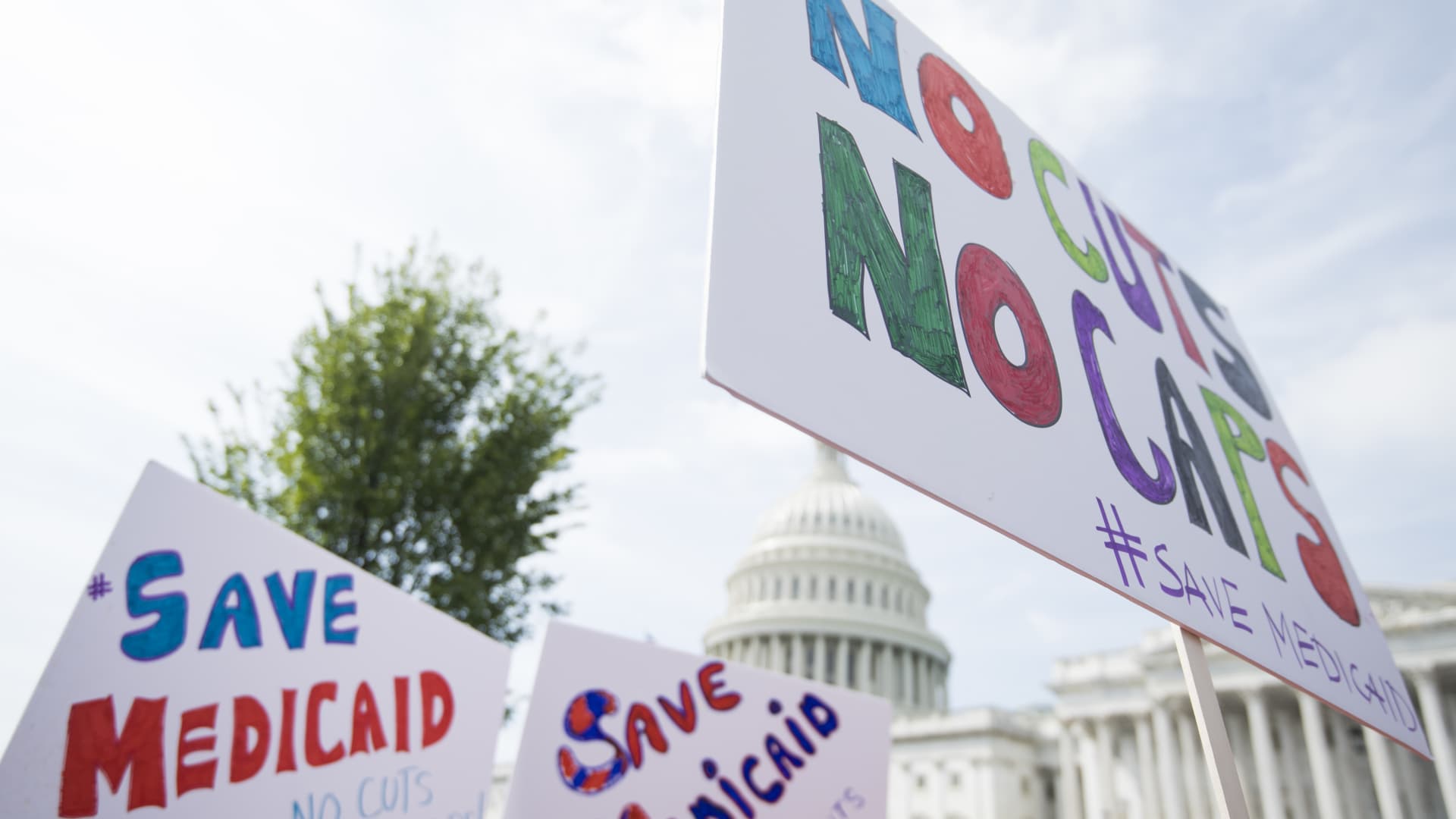Supporters hold up Save Medicaid signs during the Senate Democrats' news conference at the Capitol with disability advocates to oppose the Republicans
Supporters hold up Save Medicaid signs during the Senate Democrats’ news conference at the Capitol with disability advocates to oppose the Republicans’ Graham-Cassidy health care bill.
Bill Clark | CQ-Roll Call, Inc. | Getty Images
Nearly 3 million people have been kicked off Medicaid since Covid-19 pandemic protections expired in April, with three-quarters of those individuals losing coverage despite the fact that they may still be eligible for the public health insurance program, according to data from health researcher KFF.
Medicaid is the public health insurance program for lower income individuals and families. It is heavily financed by the federal government but largely managed by state governments.
The widespread removal of coverage is a worrying trend, because people who lose one form of insurance often struggle to find alternative coverage due to the complexity of the U.S. health insurance system, putting them at risk of ultimately becoming uninsured.
About 75% of the 2.7 million people who have lost Medicaid coverage across 32 states and Washington, D.C., were booted from the program because they did not complete the process to renew their coverage, according to the the most recent data, which was published on Monday.
That means their insurance may have been terminated even though they are still eligible for Medicaid.
Texas and Florida account for the largest shares of people kicked off Medicaid in recent months. Half a million people have lost their coverage in Texas, 81% of whom had their insurance terminated because they did not complete the renewal process. In Florida, 300,000 people lost coverage, 65% of whom did not complete the paperwork.
The number of people who have lost Medicaid coverage will only increase this month as another 11 states start the renewal process for the first time in two years, including large states such as California and New York.
The Health and Human Services Department has estimated that as many as 15 million people could lose coverage when everything is said and done, though many of these individuals are expected to transition to alternative insurance.
Still, nearly 7 million people might lose Medicaid coverage even though they remain eligible for the program, according to HHS.
Red tape
Congress barred states from kicking people off Medicaid during the Covid public health emergency in exchange for a boost in funding. As a result, Medicaid enrollment surged to a historic high of more than 86 million people by March 2023, a 26% increase compared to February 2020, according data from the Centers for Medicare and Medicaid Services.
These Medicaid coverage protections expired in April after lawmakers slipped a provision into federal spending legislation in December that allowed states to start kicking people out of the program if they were no longer eligible. Medicaid eligibility is largely based on income.
But many people are losing coverage simply due to bureaucratic red tape. This often happens when the state has outdated contact information and cannot reach the person. In other cases, a person might not understand how the renewal process works or fail to submit paperwork by the deadline.
It is particularly difficult for people with limited English proficiency to complete the paperwork to renew their Medicaid coverage, said Jennifer Tolbert, an expert on Medicaid and the uninsured at KFF.
HHS estimated last year that a third of those at risk of losing Medicaid are Hispanic and 15% are Black. The current data coming out of most states is not broken out by demographic groups.
Children are also losing Medicaid coverage in large numbers. At least a quarter of a million kids have been disenrolled from Medicaid in Arkansas, Arizona, Indiana, Oklahoma, Virginia and Washington state, according to KFF. The total number nationwide is likely higher because many states are not providing information on how many children are losing coverage.
Alternative coverage
Health experts worry that people — even those who truly are no longer eligible for Medicaid, due to a change of income, for example — may not transition to another insurer or coverage under the Affordable Care Act, commonly called Obamacare. People have to apply for Obamacare annually, and some individuals might not be aware of how the process works.
HHS has opened a special enrollment period to help people who have been kicked off Medicaid find alternative coverage through Obamacare.
HHS Secretary Xavier Becerra said in a June letter to U.S. governors that he was deeply concerned about the number of people unnecessarily losing their Medicaid coverage.
Becerra called on the governors to do everything they can to ensure people do not lose coverage for avoidable reasons. The number of people who have lost Medicaid has more than doubled since Becerra sent that letter.
HHS has the authority to stop states from terminating people’s Medicaid coverage if the agency determines that local authorities are not making a good faith effort to confirm individuals’ eligibility. CNBC has reached out to HHS for comment on the latest data.
Tolbert said limited data from a handful of states indicates that the number of people transitioning to other forms of insurance appears small, though she said this could change as more information comes in.
The uninsured rate in the U.S. will likely increase if people struggle to return to Medicaid or are unable to smoothly transition to other insurance like Obamacare, Tolbert said.
www.cnbc.com
